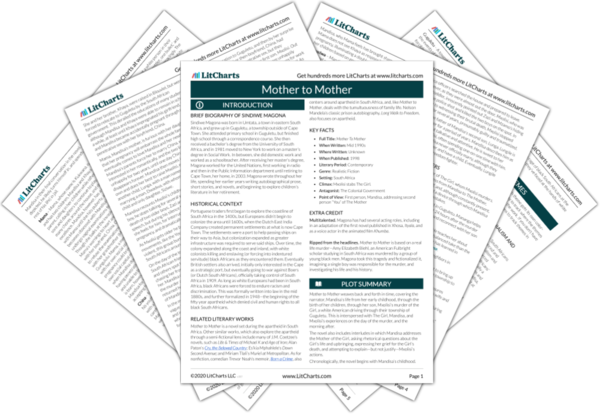Khaya Quotes in Mother to Mother
Mama did not want to hear any moaning about my not having friends at school.
“Count your blessings,” she said. “Do you know how many children would just love to change places with you?”
Change places with me? Change places with me? I’d have done anything to change places with them.
Mama’s lack of sympathy only added to my misery. I hated school and envied those children she pitied. What had they done to be that lucky? To me, the prospect of loafing the rest of the year away was quite appealing. What I didn’t know then, of course, was that some of those children would never go back to school again. Others who, like Khaya and me, were lucky enough to gain admission to a school, soon found the newness too much and played truant. From this group too, there were those who would gradually drift away from school ... and eventually leave for good.
To this day, there are not enough schools or teachers in Guguletu to accommodate all the children. You heard me talk about Operation Barcelona, just now. There never has been enough of anything in our schools. Therefore, many of the children, even today, do not go to school. There are not enough mothers during the day to force the children to go to school and stay there for the whole day. The mothers are at work. Or they are drunk. Defeated by life. Dead. We die young, these days. In the times of our grandmothers and their grandmothers before them, African people lived to see their great-great-grandchildren. Today, one is lucky to see a grandchild. Unless, of course, it is a grandchild whose arrival is an abomination — the children our children are getting before we even suspect they have come of child-bearing age.
Standard Six and, come year’s end, would sit for external examinations. A not insignificant step, as Mama reminded me daily: Gone is the time for playing.
Mama had high hopes for me ... for both of us, my brother and me. Our parents believed that education would free us from the slavery that was their lot as uneducated labourers.
Yes, we had our plans. But the year had its plans too; unbeknown to us, of course.

Khaya Quotes in Mother to Mother
Mama did not want to hear any moaning about my not having friends at school.
“Count your blessings,” she said. “Do you know how many children would just love to change places with you?”
Change places with me? Change places with me? I’d have done anything to change places with them.
Mama’s lack of sympathy only added to my misery. I hated school and envied those children she pitied. What had they done to be that lucky? To me, the prospect of loafing the rest of the year away was quite appealing. What I didn’t know then, of course, was that some of those children would never go back to school again. Others who, like Khaya and me, were lucky enough to gain admission to a school, soon found the newness too much and played truant. From this group too, there were those who would gradually drift away from school ... and eventually leave for good.
To this day, there are not enough schools or teachers in Guguletu to accommodate all the children. You heard me talk about Operation Barcelona, just now. There never has been enough of anything in our schools. Therefore, many of the children, even today, do not go to school. There are not enough mothers during the day to force the children to go to school and stay there for the whole day. The mothers are at work. Or they are drunk. Defeated by life. Dead. We die young, these days. In the times of our grandmothers and their grandmothers before them, African people lived to see their great-great-grandchildren. Today, one is lucky to see a grandchild. Unless, of course, it is a grandchild whose arrival is an abomination — the children our children are getting before we even suspect they have come of child-bearing age.
Standard Six and, come year’s end, would sit for external examinations. A not insignificant step, as Mama reminded me daily: Gone is the time for playing.
Mama had high hopes for me ... for both of us, my brother and me. Our parents believed that education would free us from the slavery that was their lot as uneducated labourers.
Yes, we had our plans. But the year had its plans too; unbeknown to us, of course.











